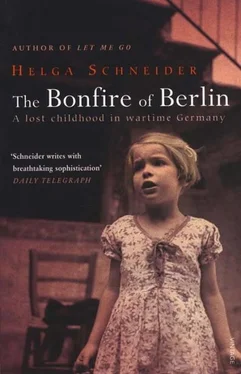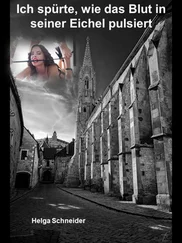The train set wearily off. The carriage was freezing, an icy wind blasting through the shattered windows. I was terrified, numbed by the cold and very thirsty. A depressing scene passed by outside: the city resembled an enormous bonfire.
Soon the carriage was filled with smoke, and I started coughing. I wanted to go to the toilet, and I longed to return to Eden. We changed trains twice. Finally we reached Steglitz station, where we were swept along by the crowd. An officer, shouting at the top of his voice, was rounding up a squadron of very young soldiers, some of them keen and euphoric, some of them stiff, anxious and lost. Standing on the station forecourt I tried to breathe deeply, but the air was filled with a heavy smell of burning. The unnatural heat made me shiver. I stared in confusion at the ashes covering the cobbles, unable to work out where they were coming from. But Hilde urged me on: ‘Don t stand there like a statue, let’s get a move on before the air-raid warning.’ She gripped my hand in hers.
We passed by long terraces of bombed, smoking ruins. The footpath was scattered with broken glass. I slipped and fell, some splinters pierced my arm. Hilde snorted: ‘Can’t you be more careful?’
Then she told me we were not going to Friedrichsruher Strasse but to the family home, where I would find Peter, our stepmother and her father.
‘My cellar is safer than yours,’ she explained, adding out of the blue, ‘My mother died last month.’ ‘Your mother?’ I asked distractedly.
‘Your grandmother. We were able to bury her in Lichtenberg cemetery.’
My grandmother? Ah, she meant my grandmother by marriage. I exclaimed rebelliously, ‘My grandmother is in Poland!’
Hilde said acidly: ‘Whether you like it or not, my mother was also your grandmother.’
I didn’t dare to contradict her.
‘She had a heart-attack during an air-raid,’ Hilde explained. I nodded dispassionately, having only seen that ‘grandmother’ on four occasions. Noting my indifference, Hilde sighed, shook her head and said bitterly, ‘It doesn’t matter,’ letting go of my hand. On the corner of Lothar Bucher Strasse, I asked her, ‘Where is your house?’ I could see nothing but ruins. ‘It’s the very last building.’
‘I need a pee,’ I whined.
She sighed again. ‘All right, then, go ahead, what are you waiting for?’
‘Where?’
‘Well, here, where else, what’s the problem?’
‘I’m ashamed.’
‘But no-one can see you!’
I hesitated. She smiled tiredly and turned to look towards the end of the street where her house was. I immediately crouched down and peed in a hole that reeked of sulphur, but at the same time something drew my attention. It was the torso of a teddy bear. I was about to pick it up when Hilde thundered, ‘What on earth are you doing? You’re not to bring home everything you find in the street!’ And she dragged me away.
We had almost reached the door of the house when a woman ran towards us, shouting, ‘Get away from here! Run to the shelter! They’re coming!’
I looked up and saw a triangle of low-flying planes followed by other triangles; at the same time a chorus of wailing sirens went up. My heart leapt into my throat: the sirens had sounded too late, the planes had already begun firing, and all hell broke loose. I was short of breath and thought I would collapse. Then a powerful blast of air hurled me against the door. Feeling as though I was falling into a deep ravine, I lost consciousness.
When I came to, I found myself lying on the ground with a loud roaring in my ears. Everything around me seemed to be flying through the air, fragments of brick, bits of tarmac, pieces of wood. Everything was shaking, the earth writhed and slumped, furrowed as though gashed open by a crazed ploughman. I saw Hilde lying at the door, arms slack, eyes closed, with a trickle of blood running slowly from her hairline to the comer of her mouth. She looked as if she was dead. The roaring was still all around us, and as I burst into terrified tears, a lashing rain of rubble crashed down on me like a hurricane. My mouth and nostrils filled with dust and sand, and I felt I was suffocating. I spat earth, blood and bits of brick. I tried to get up, but something was crushing me to the ground. I was asphyxiated by a kind of searing heat. My hands felt as though they been roasted. Finally, still spitting blood, I crept towards Hilde on my hands and knees. All of a sudden a sinister silence fell, even more terrifying than the din that had preceded it.
I reached Hilde and stared at her in astonishment, touching her chin gently. Suddenly she opened her eyes and gazed at me vacantly, murmuring, ‘What happened?’ Then her face sprang into life: ‘Oh my God, are you injured?’
‘I don’t know…’ I looked at my hands, my arms. There was blood, I was horrified. I choked back my nausea. Suddenly Hilde whispered, ‘Please don’t turn round… But I turned round straight away and saw her. The woman who had shouted ‘Run to the shelter!’ She was lying not far from us in a pool of blood, headless. I vomited. I vomited my guts up. I vomited up all my horror at the world.
Meanwhile Hilde had struggled to her feet and was hammering on the door. ‘Damnation!’ she cursed. ‘It must be jammed!’ Finally someone opened the door, and a pair of arms pulled us inside. We went down a flight of stairs.
The cellar was dark and full of people who stared at us. There was no air. The first person I saw was my brother, and I immediately burst into tears again. In a broken voice I yelled, ‘Peter, I’m back!’
He looked at me uncomprehendingly in the flickering light of a lamp and then glanced questioningly at our stepmother, who said, ‘It’s your sister, Helga.’
He went on staring at me, rubbing the tip of his shoe against his calf. Peter, thin and less curly-haired, Peter, taller and not as chubby. Peter: my brother. He couldn’t make head or tail of the situation, and stuck a finger in his nose.
‘Helga?’ he asked finally, tilting his head. Then I flew to him and hugged him. He started crying, and I cried with him. My hands touched an emaciated body. It broke my heart. We all hugged each other. Hilde asked Peter, ‘Have you been good, you little rascal?’ He muttered, ‘I threw up.’
I was happy to see my stepmother’s father again. He was tall and distinguished, with clear, intelligent eyes, ; grey hair with a parting, elegant if crumpled clothes. Who thinks about ironing in wartime?
Then an old man examined us carefully. ‘You have only superficial injuries,’ he declared. ‘You are lucky. Fraulein Hilde, you could have died!’ Hilde said, ‘It’s a scandal, they sound the air-raid warning when the planes are already overhead!’ At that moment the cacophony of machine-gun fire struck up again. ‘They’ve come back, the swine,’ said the old man. ‘May God blow up the lot of them!’
Faces grew tense with anxiety, and with each explosion people opened their mouths and blocked their ears. This, I discovered later, stopped their eardrums bursting.
When the raid was over, we had our supper: bread and turnips. The bread was dry, and the turnips were withered. Our little jar of jam had been lost along with my suitcase in the inferno.
After our meagre supper, my stepmother put me to bed on the top of a rudimentary bunk bed. She asked me about Eden and told me about life in Berlin. Shortly afterwards my grandfather came to say goodnight. ‘Call me Opa,’ he said kindly. ‘I’m here if you need anything. Try to rest.’ But I was too shaken. I was cold and felt lost and unhappy. Looking around me, I saw poor things and poor people in a gloomy cellar lit by a single oil lamp that cast gloomy shadows on the wall. An old woman, wrapped in an absurd black taffeta dress, was praying. ‘Would you stop it?’ an elderly man roared, glancing at her with exasperated reproach. But the old woman replied calmly, ‘It would do you good, Herr Hammer, to communicate with the Lord.’ The man replied scornfully, ‘A God who allows this war to happen doesn’t deserve prayers!’ And he spat on the floor.
Читать дальше












